The car horns blared as Joe Biden took the stage just before 1 a.m.—not to proclaim victory, but to urge his supporters not to lose hope, no matter what President Donald Trump might say. “We believe we are on track to win this election,” the former Vice President told the crowd in Wilmington, Del., on Nov. 4. “It ain’t over until every vote is counted. Keep the faith, guys.”
As the new day dawned and dragged on, it increasingly looked as though Biden was right. Having flipped Michigan, Arizona and Wisconsin, Biden appeared to be inching toward victory. Pennsylvania, Georgia, Nevada and North Carolina remained too close to call as of the evening of Nov. 4. Independent forecasters believed Biden was likely to eke out the requisite 270 electoral votes when all the votes were counted, over the President’s noisy objections.
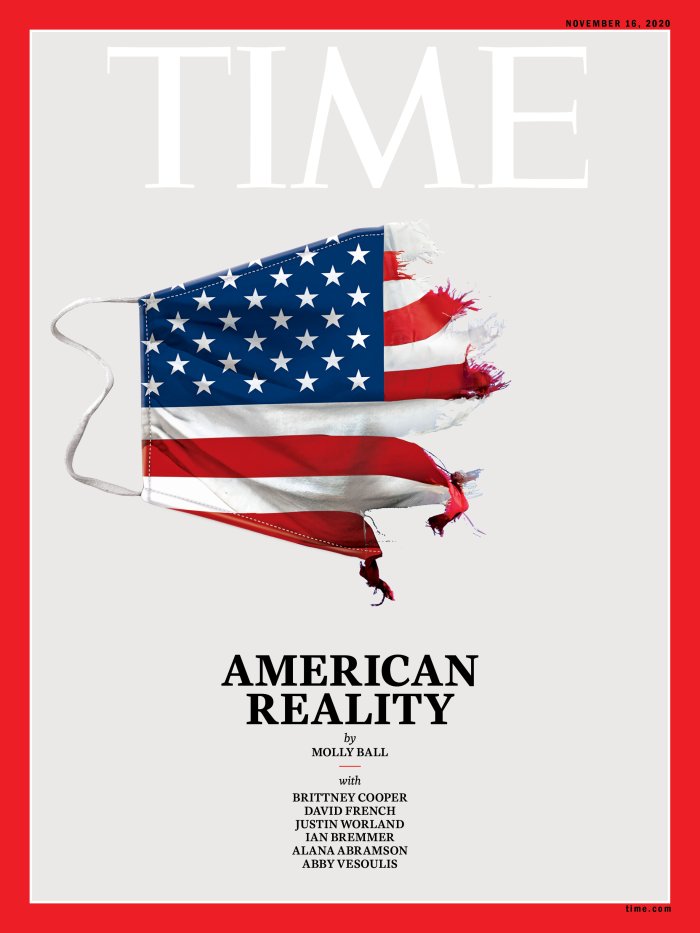 TIME illustration
TIME illustration
Even if he has lost, a President who trampled the rule of law for four years was on pace to collect millions more votes this time than last. And though they braced for a bloodbath, the congressional Republicans who enabled him instead notched unexpected gains. The GOP appeared likely to retain the majority in the Senate and cut into the Democratic House majority, defying the polls and fundraising deficits. Republicans held onto states such as Florida, South Carolina, Ohio and Iowa that Democrats had hoped to flip. They cut into Democrats’ margins with nonwhite voters, made gains with Latinos in South Florida and the Rio Grande Valley, and racked up huge turnout among non-college-educated white people, while halting what many conservatives feared was an inexorable slide in the suburbs.
Amid record turnout, Biden seemed sure to win the popular vote, possibly with an outright majority—a resounding statement by any standard. But many Democrats expected more. They believed that voters had soured on Trump and his party, that his mishandling of the pandemic and divisive style had alienated a wide swath of the electorate, that a new political era was about to be born and Trumpism banished to history’s dustbin. They awoke to a different reality. “Democrats always argued, ‘If more people voted, we would win,’” says GOP strategist Brad Todd, co-author of The Great Revolt: Inside the Populist Coalition Reshaping American Politics. “Well, guess what? Everybody voted, and it didn’t help the Democrats. There is a multi-racial, working-class ethos that is animating the new Republican coalition.”
As the votes were tallied into the following day, the candidates’ positions fell along predictable lines. The challenger encouraged the core exercise of democracy to continue, while the President tried to stop it. Biden’s camp urged patience; Trump voiced unfounded suspicions about fraud and cast unwarranted doubt on still incoming returns. Despite widespread fears of chaos, the vote was mostly peaceful and devoid of major irregularities. The President’s baseless declaration of victory was a sign that the test he has posed to American institutions isn’t over yet.
If Biden emerges as the winner, his achievement—toppling an incumbent who manipulated the levers of government to try to gain an advantage, and made voter suppression a core campaign strategy—shouldn’t be discounted. As the vote count continued, his campaign projected confidence and noted it had always said the race would be close. But even if he becomes the next President, it seems clear that he will be governing Trump’s America: a nation unpersuaded by “Kumbaya” calls for unity and compassion, determined instead to burrow ever deeper into mutual antagonism. Win or lose, Trump has engineered a lasting tectonic shift in the American political landscape, fomenting a level of anger, resentment and suspicion that will not be easy for his successor to surmount.
Whoever takes the oath of office on Jan. 20 will be tested by a historic set of challenges. The COVID-19 pandemic has just entered its worst phase yet, rampaging across the country virtually unchecked. The economic fallout from the virus continues to worsen without new federal aid. Trump has given few hints of what his next months in office may hold, but few expect them to be smooth. An urgent set of policy problems, from climate change to health care to the nation’s crumbling infrastructure, may run into the wall of divided government. “If in fact Biden wins, it’s still the case that an openly bigoted aspiring authoritarian not only won the presidency but captured the complete loyalty of one of two major political parties, and—but for a once-in-a-century pandemic—he might have been re-elected,” says Ian Bassin, co-founder of Protect Democracy, a non-partisan legal group. “If that doesn’t tell you that something is completely rotten in the foundations of our democracy, I don’t know what would.”
The story of American politics in the 21st century has been one of escalating polarization and gridlock, a nihilistic feedback loop that has made the country all but impossible to lead. For years, a chaos-ridden nation has waited to deliver its verdict on Trump’s unorthodox presidency. But this is 2020—the year when up was down and real was fake, the year of the plague, the year of the unexpected: of course it would not be that easy. Both sides hoped for a knockout blow, a landslide that would forever settle the question of which version of America prevails. Instead, our identity crisis continues.
 Steven Lewandowski views returns outside Chase Center in Wilmington, Del., on Nov. 3. Tony Luong for TIME
Steven Lewandowski views returns outside Chase Center in Wilmington, Del., on Nov. 3. Tony Luong for TIME
 Violetta Smith holds portrait balloons of Harris and Biden at an outdoor election-night event in Wilmington, Del. Tony Luong for TIME
Violetta Smith holds portrait balloons of Harris and Biden at an outdoor election-night event in Wilmington, Del. Tony Luong for TIME
The campaign unfolded over a year so convulsive that the third presidential impeachment in history now seems a distant memory. COVID-19 upended Americans’ lives and drained their bank accounts. Millions of people, from all walks of life, took to the streets to protest police violence. The West Coast’s sky was blotted by fire for weeks, while the East was battered by a record hurricane season. And yet, against this backdrop of chaos there was an odd political stasis: Trump’s standing in polls remained about where it had been when Biden first entered the race—a sign, Democrats believed, that Trump had little chance of persuading an electorate that had long since rejected him.
Not that he particularly tried. Strategists of both parties believe the campaign was winnable for the incumbent if he had embraced a more traditional strategy and style—something his entire presidency has shown him to be uninterested in doing. Discarding the advice of the political professionals, Trump insisted on rerunning the 2016 election, down to the leaked emails and antiestablishment rhetoric. He made little alteration to his bull-in-a-china-shop attitude, even though the hell-scape he raged against was now one that unfolded on his watch. “COVID certainly didn’t help, but this election was about the President’s performance over the last four years, not just the last nine months,” says Brendan Buck, a former top adviser to the GOP ex–House Speaker Paul Ryan. “It was four years of bumbling his way through every issue, alienating everyone who didn’t agree with him, and never being able to use the tools he had for any particular good.”
As Trump careened from one outrage to another, Biden limited his campaign to theatrically cautious appearances: masked speeches to small, distanced groups; “drive-in” rallies where attendees sat in their cars. The longtime pol known for his garrulousness and gaffes stuck unerringly to the script. Many lines in his final television ads were identical to what he said when he launched his campaign a year and a half before. Unusually for a general-election candidate, Biden actually saw the public’s estimation of him improve over the course of the campaign. Only about 10% of the ads aired by Biden’s campaign and allies were attacks on Trump, according to the Wesleyan Media Project. “The message has been incredibly consistent: an implicit contrast with Trump’s character flaws and their consequences for real people,” says Democratic strategist Jesse Ferguson, a veteran of Hillary Clinton’s 2016 campaign. “Trump is self-absorbed and chaotic; Biden is the opposite: in it for others, stable, the antidote to everything Trump represents.” But Democrats now wonder if Biden, like Clinton before him, put too much emphasis on character and not enough on kitchen-table issues, and whether his decision not to campaign more in person was a missed opportunity.
Biden was buoyed by a vast grassroots movement: the Trump era has seen a frenzy of political action, with thousands of newly motivated activists leading local political groups. Middle-class women gathered their Facebook friends to drink wine and make canvassing phone calls; disaffected Republicans waged a multimillion-dollar campaign to mobilize their peers. A weak fundraiser who ended the primary essentially broke, Biden shattered campaign-finance records—his campaign hauled in $952 million, dwarfing the incumbent by more than $300 million—as liberals showered donations on him and the party’s congressional candidates.
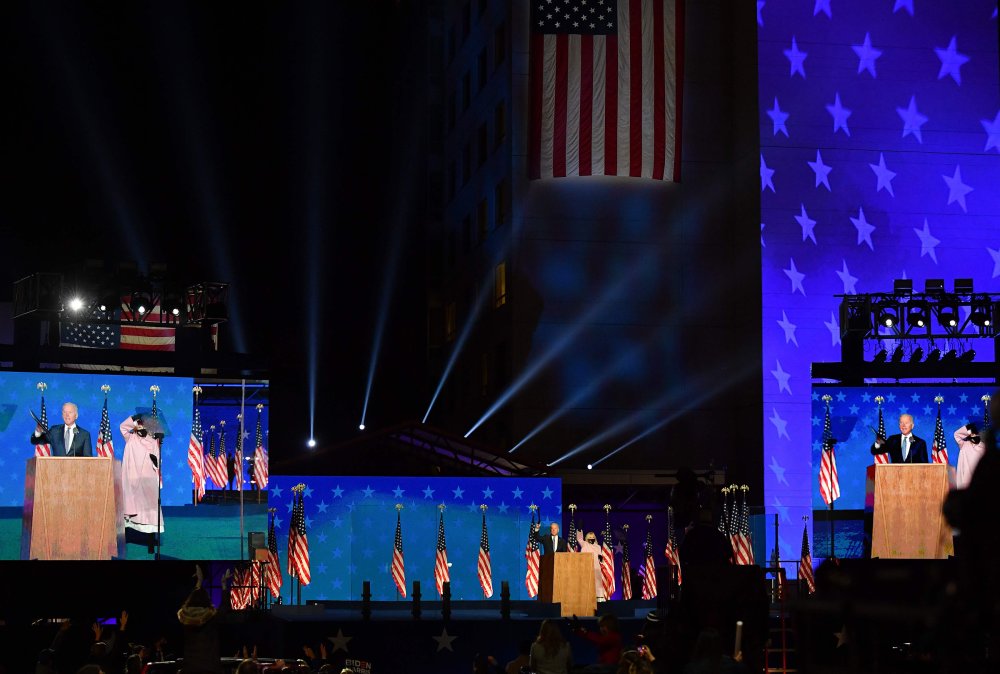 “It’s not my place or Donald Trump’s place to declare who’s won this election. That’s the decision of the American people.” — Joe Biden, at the Chase Center in Wilmington, Del., just after midnight on Nov. 4. Angela Weiss—AFP/Getty Images
“It’s not my place or Donald Trump’s place to declare who’s won this election. That’s the decision of the American people.” — Joe Biden, at the Chase Center in Wilmington, Del., just after midnight on Nov. 4. Angela Weiss—AFP/Getty Images
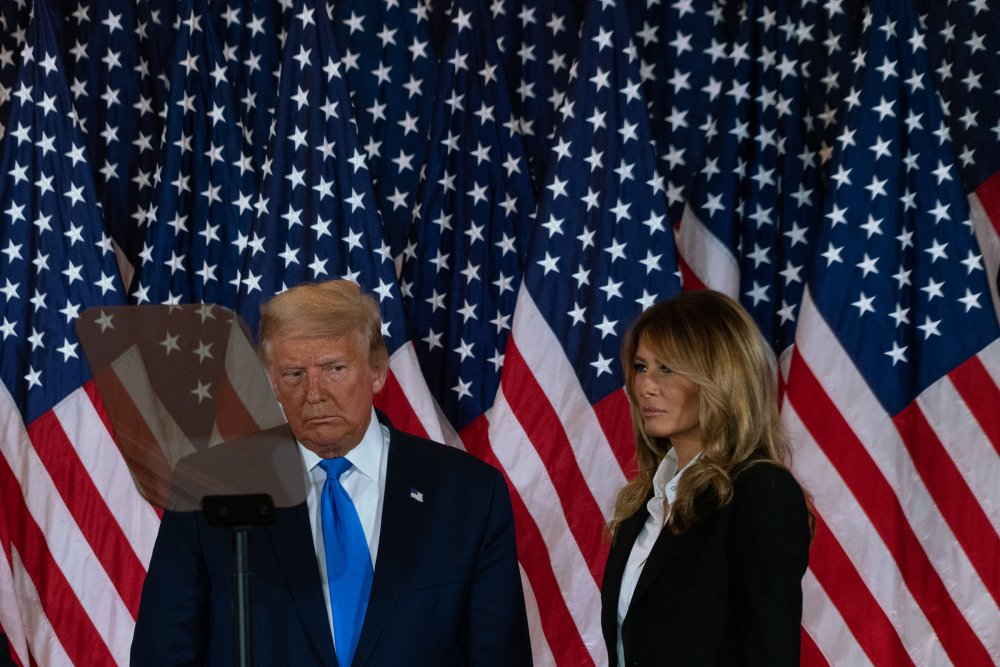 “We’ll be going to the U.S. Supreme Court.” — Donald Trump, in the East Room of the White House early on the morning of Nov. 4. Peter van Agtmael—Magnum Photos for TIME
“We’ll be going to the U.S. Supreme Court.” — Donald Trump, in the East Room of the White House early on the morning of Nov. 4. Peter van Agtmael—Magnum Photos for TIME
Trump had his own army of enthusiastic supporters. His massive rallies—held at cavernous airport hangars and sports arenas with no social distancing and limited mask wearing—were not just aimed at flattering Trump’s ego or creating images of enthusiastic throngs for local and national media. Republican National Committee (RNC) teams perched outside each event, registering new voters and creating a database of supporters. “People sometimes pooh-pooh the rallies and say there’s really no campaign structural benefit to them,” says Brian Ballard, a Republican lobbyist with close ties to Trump. But they allowed the campaign to “utilize the crowds that not only go, but the crowds that registered to go, and sometimes that number is five times the amount of folks that actually show up.”
Trump also kept up his field-organizing program through the summer, while Biden’s team hung back out of safety concerns. The joint field program between the RNC and the Trump campaign boasted 2.6 million volunteers, according to figures provided by the RNC. They made more than 182 million voter contacts—more than five times what they did in 2016—and added nearly 174,000 new GOP voters to the rolls. Early voter-registration figures in Florida, North Carolina and other states showed that Republicans had “essentially neutralized what had been a Democrat advantage” by mobilizing new voters, says John Podesta, who chaired Clinton’s failed 2016 presidential bid.
Democrats underestimated the Trump tribe’s breadth to their detriment. “I think you miss some of the Trump quotient [in polls] because these folks come out of the woodwork, and they’re out of the woods and waters of South Carolina,” says former GOP Representative Mark Sanford, a Trump critic whose Charleston-area district Republicans took back on Nov. 3. Despite putting more than $100 million behind Senate candidate Jaime Harrison, Democrats fell short of defeating incumbent Lindsey Graham by double digits. “These Trump rallies and Trump parades and all those kinds of things, they don’t strike me as the type that would be answering a polling call,” Sanford says.
Having made the decision to forgo traditional field organizing, Biden’s campaign manager, Jen O’Malley Dillon, instead turned the campaign into what may be the largest digital-organizing machine in American political history. She “took a risk in investing as much in digital acquisition as she did,” says Patrick Stevenson, chief mobilization officer at the Democratic National Committee. “You’re putting down $1 million in April that you’re expecting to show back up as $5 million in August.” By September, the digital operation was printing money. Digital organizers recruited more than 200,000 volunteers and deployed them on hundreds of millions of text messages and phone calls. But the result raises questions about whether this virtual juggernaut could really substitute for old-fashioned face-to-face campaigning.
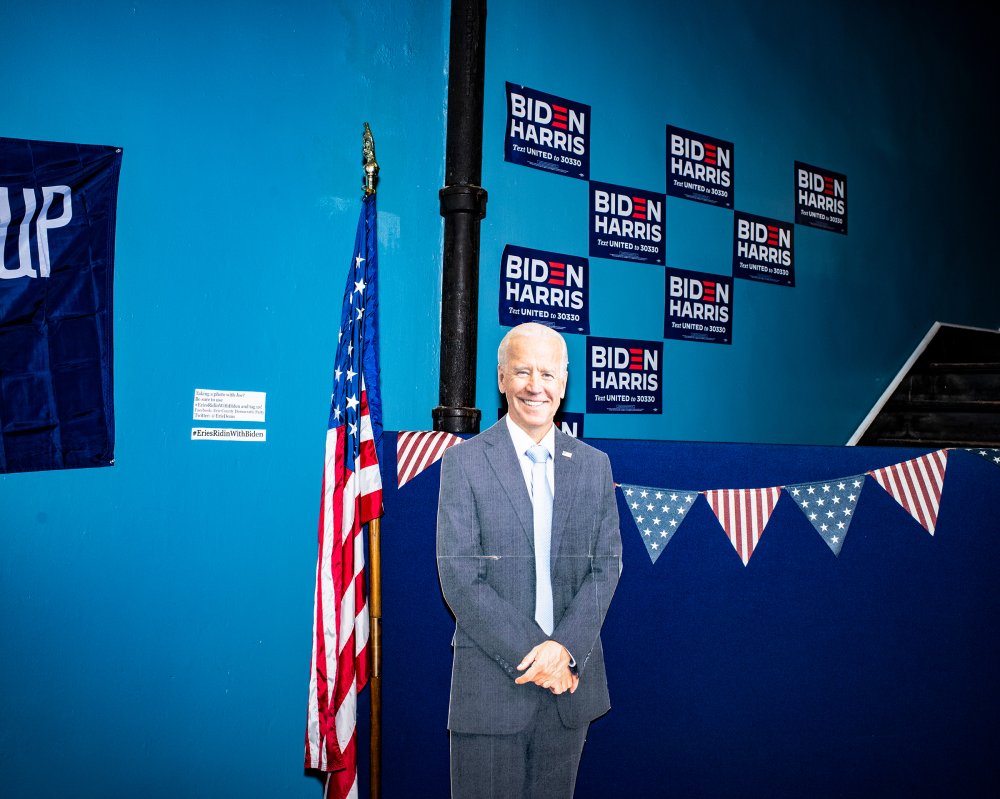 The different style of the campaigns—and of their supporters—was echoed in their Pennsylvania offices. Lorenzo Meloni—Magnum Photos for TIME
The different style of the campaigns—and of their supporters—was echoed in their Pennsylvania offices. Lorenzo Meloni—Magnum Photos for TIME
 David Lawrence, a Republican supporter, in Erie on Nov. 3. Lorenzo Meloni—Magnum Photos for TIME
David Lawrence, a Republican supporter, in Erie on Nov. 3. Lorenzo Meloni—Magnum Photos for TIME
What comes next is anybody’s guess. There are 2½ months until the next Inauguration. A lame-duck President with the world’s biggest platform, an even larger ego, and millions of supporters who internalized his rhetoric about election “rigging” could stir a lot of trouble on his way out of town. So much, including the odds of violence erupting, depends on Trump’s rhetoric in the days and weeks to come. Then there is the question whether he might tap the federal treasury on the way out—his companies and family have pocketed millions in government funds during his time in office—or seek to pardon himself and his allies. “His impulse might be to abuse executive authority, and my hope and prayer is that those around him would restrain him, though they haven’t been very successful so far,” says Tom Ridge, the GOP former Pennsylvania governor and Homeland Security Secretary who endorsed Biden. “I have never felt that this President has ever truly respected the Constitution, the rule of law and the freedoms embodied in our democratic process.”
If Biden does take office, he will confront a set of challenges like few Presidents before him. He has laid out a comprehensive—and expensive—federal plan to combat the COVID-19 pandemic that includes promoting mask wearing, ramping up testing and the production of protective equipment, improving information transparency and scientific reopening guidance, and creating and distributing a vaccine. Democrats have previously proposed trillions in new spending to help individuals, businesses and local governments and shore up the health care system—needs that will only grow in the coming months.
The coronavirus is far from the only problem Biden and the Democrats have promised to solve. A former chairman of the Senate Foreign Relations Committee, Biden would likely devote great attention to restoring America’s traditional trade and security alliances. House Speaker Nancy Pelosi recently said the congressional agenda for 2021 would include a major infrastructure bill and an expansion of health care. Liberals will be pushing for fast action on police reform, climate and immigration. Democrats have been remarkably unified since Biden effectively sewed up the nomination in March, but the party’s left wing has signaled it will not be so deferential once victory is in hand. Progressive groups have been circulating lists of potential Biden nominees they would (and would not) accept for key Administration posts.
 Reflecting the exhaustion on both sides of the aisle, a Trump fan rests on a table at an election-night party in Las Vegas. John Locher—AP
Reflecting the exhaustion on both sides of the aisle, a Trump fan rests on a table at an election-night party in Las Vegas. John Locher—AP
Four years of trump have left Democrats with few worries about overreading their mandate. “If we win the election, we have a mandate to make change, period,” says Guy Cecil, president of the Democratic super PAC Priorities USA. But if Republicans retain their hold on the Senate, prospects for major legislation will be dim. Republicans had won 48 seats as of the evening of Nov. 4, with at least one January runoff in Georgia that could decide the balance of power in the chamber.
Whatever the ultimate result, the election exposed the shaky edifice of U.S. democracy. From the antiquated governing institutions that increasingly reward minoritarian rule, to the badly wounded norms surrounding the independent administration of justice, to the flimsy protections of supposedly universal suffrage, to the nation’s balky and underfunded election infrastructure, Trump’s presidency has laid bare the weaknesses in our system. But initiatives to reform campaign finance, government ethics and voting rights seem fated to run aground in a divided Washington.
A round of harsh recriminations seems certain for the Democrats, who had assumed that their coalition of minorities, college-educated white people and young voters was destined only to grow as a share of the electorate, while the post-Trump GOP would be doomed to rely on a dwindling population of older, white, non-college-educated voters. Instead, Republicans appeared to have increased their share of the Black and Latino vote. Democrats failed to topple any GOP incumbents in Texas and lost a congressional seat in New Mexico. Their hopes for a surge of college-educated suburban voters also fell short, suggesting that the GOP’s attacks on liberal ideology proved effective in places like Oklahoma City and Cedar Rapids, Iowa. “Democrats need to ask themselves why someone like Joe Biden is an endangered species in the party,” says Justin Gest, a political scientist at George Mason University and author of The New Minority: White Working Class Politics in an Age of Immigration and Inequality. “Why is the party of experts, urban intellectuals and woke social-movement activists not producing candidates who can mobilize people in Montana, Ohio, North Carolina? It just doesn’t look like a national party.”
Republicans, even if they lose the presidency, are likely to feel emboldened to continue pursuing Trump’s themes. “Donald Trump isn’t going away,” says Buck, the former Ryan adviser. “He’s still going to be the leader of the party and the biggest voice, and he’ll at least flirt with the idea of running again. It’s going to continue to be a populist, grievance-fueled party.”
Some elections mark a breakthrough—the emergence of a new American majority after years of conflict and gridlock. A landslide like Franklin D. Roosevelt’s in 1932 or Ronald Reagan’s in 1980 would have signaled a nation ready to move on from its cultural and ideological cleavages and seek some way forward together. Instead it looks more bitterly split than ever. “There was a substantial political divide in this country before Donald Trump was elected,” Ridge says. “His presidency has exacerbated that divide to an almost unimaginable degree. But that did not begin with Donald Trump, and it will not end with him, either.” —With reporting by Charlotte Alter, Brian Bennett, Tessa Berenson, Abby Vesoulis and Lissandra Villa/Washington; Anna Purna Kambhampaty/Honolulu; and Mariah Espada, Alejandro de la Garza and Simmone Shah/New York
This appears in the November 16, 2020 issue of TIME.
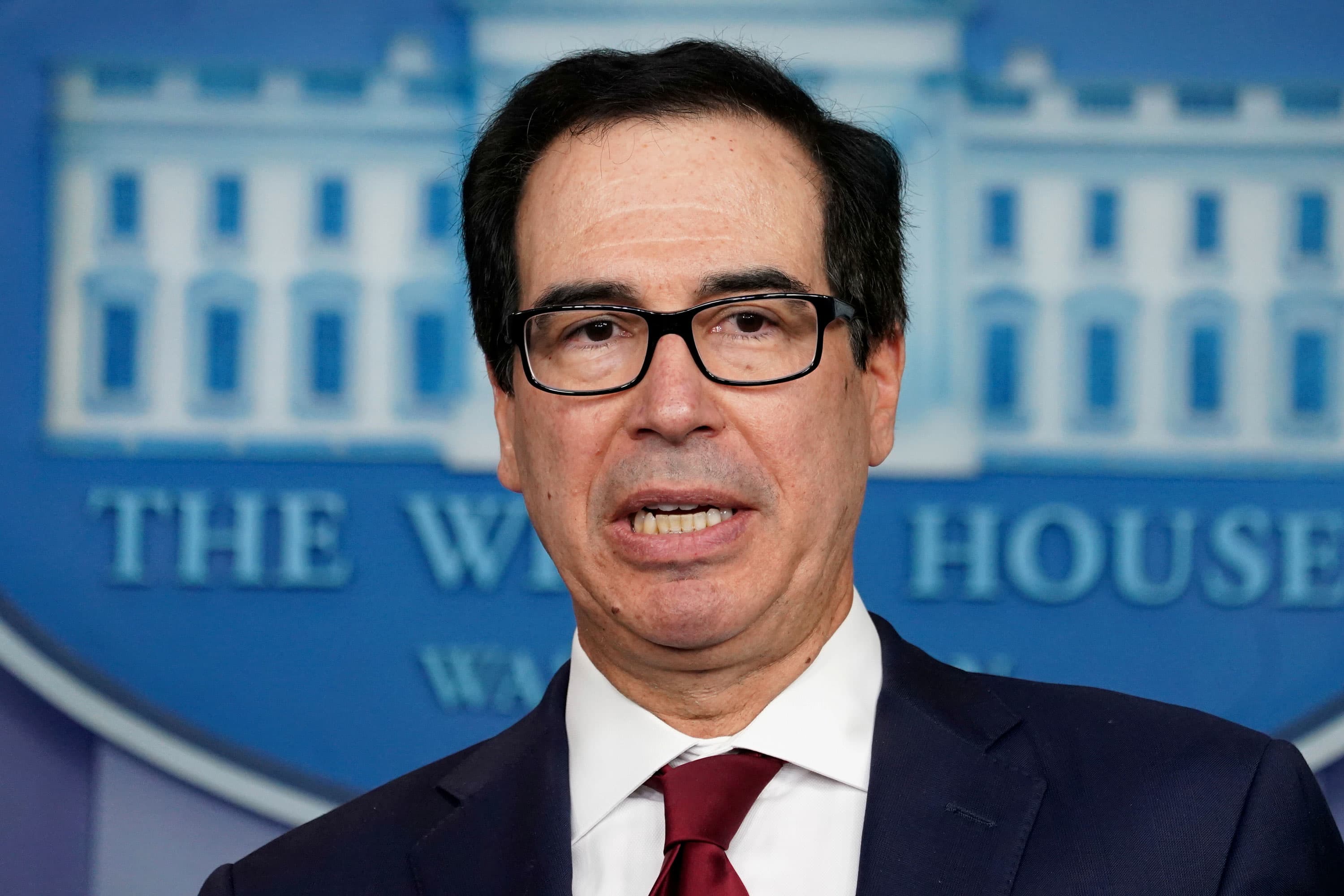

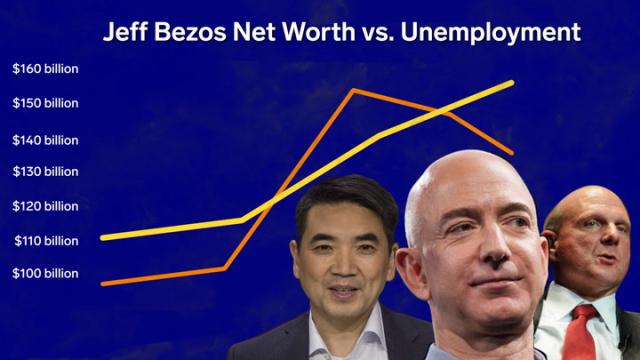




















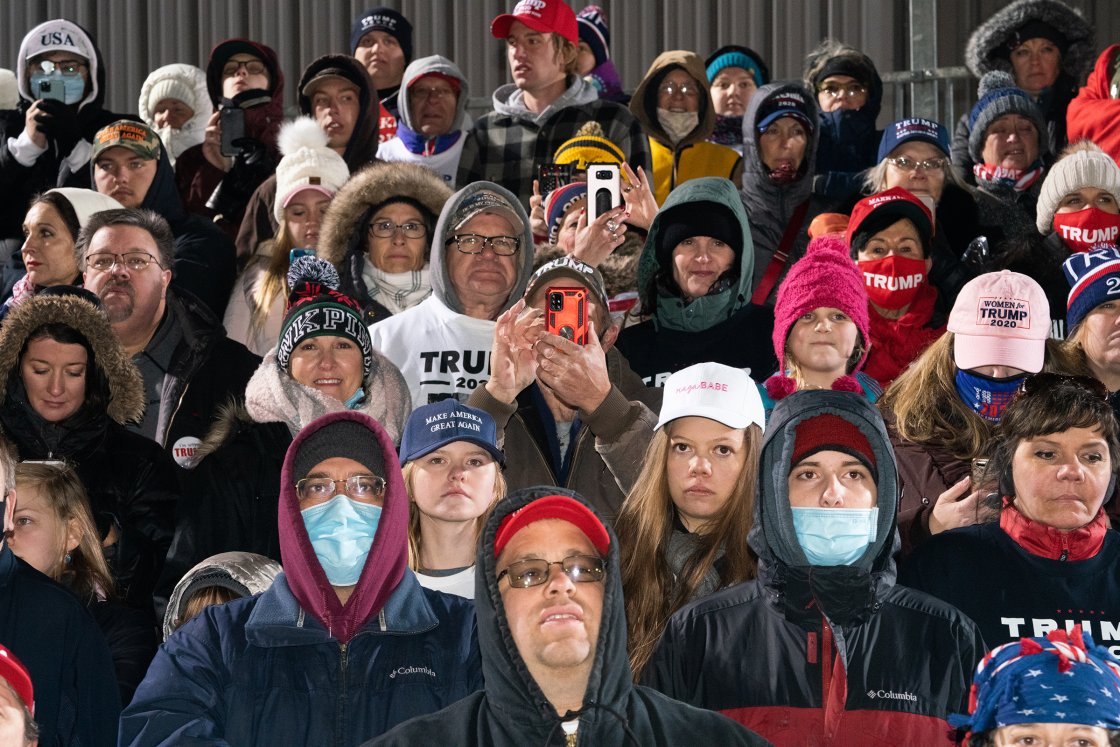 The President’s supporters in Grand Rapids, Mich., ignored the chill at the final rally of his 2020 campaign. Peter van Agtmael—Magnum Photos for TIME
The President’s supporters in Grand Rapids, Mich., ignored the chill at the final rally of his 2020 campaign. Peter van Agtmael—Magnum Photos for TIME TIME illustration
TIME illustration Steven Lewandowski views returns outside Chase Center in Wilmington, Del., on Nov. 3. Tony Luong for TIME
Steven Lewandowski views returns outside Chase Center in Wilmington, Del., on Nov. 3. Tony Luong for TIME Violetta Smith holds portrait balloons of Harris and Biden at an outdoor election-night event in Wilmington, Del. Tony Luong for TIME
Violetta Smith holds portrait balloons of Harris and Biden at an outdoor election-night event in Wilmington, Del. Tony Luong for TIME “It’s not my place or Donald Trump’s place to declare who’s won this election. That’s the decision of the American people.” — Joe Biden, at the Chase Center in Wilmington, Del., just after midnight on Nov. 4. Angela Weiss—AFP/Getty Images
“It’s not my place or Donald Trump’s place to declare who’s won this election. That’s the decision of the American people.” — Joe Biden, at the Chase Center in Wilmington, Del., just after midnight on Nov. 4. Angela Weiss—AFP/Getty Images “We’ll be going to the U.S. Supreme Court.” — Donald Trump, in the East Room of the White House early on the morning of Nov. 4. Peter van Agtmael—Magnum Photos for TIME
“We’ll be going to the U.S. Supreme Court.” — Donald Trump, in the East Room of the White House early on the morning of Nov. 4. Peter van Agtmael—Magnum Photos for TIME The different style of the campaigns—and of their supporters—was echoed in their Pennsylvania offices. Lorenzo Meloni—Magnum Photos for TIME
The different style of the campaigns—and of their supporters—was echoed in their Pennsylvania offices. Lorenzo Meloni—Magnum Photos for TIME David Lawrence, a Republican supporter, in Erie on Nov. 3. Lorenzo Meloni—Magnum Photos for TIME
David Lawrence, a Republican supporter, in Erie on Nov. 3. Lorenzo Meloni—Magnum Photos for TIME Reflecting the exhaustion on both sides of the aisle, a Trump fan rests on a table at an election-night party in Las Vegas. John Locher—AP
Reflecting the exhaustion on both sides of the aisle, a Trump fan rests on a table at an election-night party in Las Vegas. John Locher—AP
